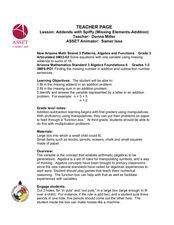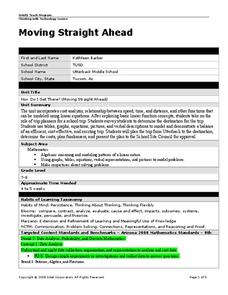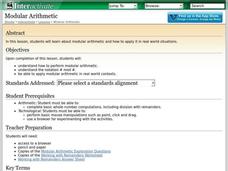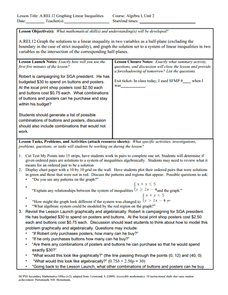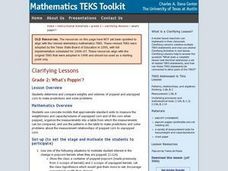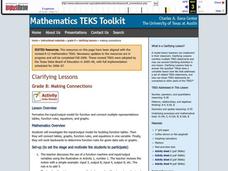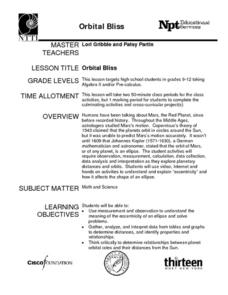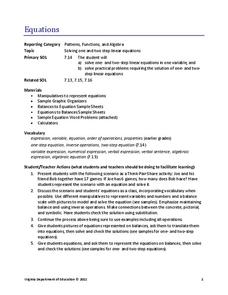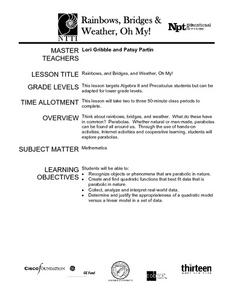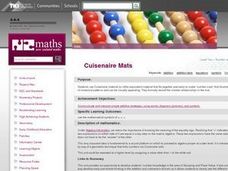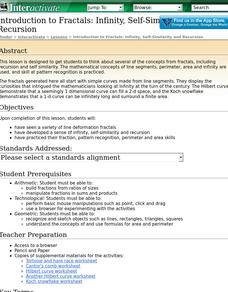Curated OER
Addends with Spiffy
Students solve single variable equations. In this missing addend lesson, students solve problems with missing addends. Students create a function box to help study numerical reasoning.
Curated OER
Moving Straight Ahead
Students analyze the relationship between speed, time and distance. In this math lesson, students plan a school trip. Students determine the efficiency and cost effectiveness of a trip.
Curated OER
Giggle, Giggle, Quack Pizza Fractions
Students explore the concept of multiplication by using pizza. They read an article discussing how math is used everyday. They try to determine how many pizzas they would need to feed the class.
Curated OER
Modular Arithmetic
Students investigate modular arithmetic and how to use it to solve real world problems. In this modular arithmetic instructional activity, students use computers to work on modular arithmetic after a teacher guided instructional...
Curated OER
Graphing Linear Inequalities
Eighth graders extend skills for representing and solving linear equations to linear inequalities. Lesson activities build understanding and skill by plotting ordered pairs of numbers that either satisfy or do not satisfy a given...
Curated OER
What's Poppin'?
Second graders determine and compare weights and volumes of popped and unpopped corn to make predictions and solve problems. Students combine the data of each group into a graph. They construct questions, statements and story problems...
Curated OER
Will There be Enough Water?
Students investigate water usage, water available, and water demand historically in the local area. They use projections of water usage, availability and demand up to the year 2050. Students use graphs to relate as well as compare and...
Curated OER
Water - Planning for the Future
Middle schoolers explore and examine the increases and/or decreases for water user groups: irrigation, municipal, manufacturing, steam electric power generation cooling, livestock, and mining. They utilize percentage changes during their...
Curated OER
Divide and Conquer
Seventh graders analyze responses to different types of problems. Using pictures and diagrams, they explore and model the division of fractions. Students examine situations that call for division whether with the whole numbers or with...
Curated OER
Making Connections
Eighth graders investigate the input/output model for building function tables. From the data, 8th graders connect tables, graphs, function rules, and equations in one variable. They work backwards to determine function rules for given...
Curated OER
Money Circulation: A Story of Trade and Commerce
Students are introduced to the meaning, symbolism, and value of the quarter. They determine the percentage of total monetary value held in quarters and graph the results. Students infer about the U.S. Mint's distrubution of coins. They...
Curated OER
Addition and Subtraction in Center Time
First graders complete center activities as they practice their addition and subtraction skills. They listen to Rick Walton's, "How Many, How Many, How Many" before playing games, and completing addition and subtraction worksheets at...
Curated OER
Impossible Graphs
Students practice plotting functions on the Cartesian coordinate plane while participating in a discussion about the Possible Or Not worksheet/activity. Students also use the Impossible Graphs worksheet to practice reading a graph,...
Curated OER
Orbital Bliss
Most young mathematicians are aware that the planets don’t orbit the sun in a circle but rather as an ellipse, but have never studied this interesting feature. This resource looks at the planetary orbits in more detail and helps learners...
Virginia Department of Education
Equations
Science equipment can be handy for math class, too. Scholars learn to solve one- and two-step linear equations by using the concept of a balance. They solve real-world problems in a variety of contexts by writing and solving linear...
Curated OER
Rainbows, Bridges & Weather, Oh My!
Explore how real-world applications can be parabolic in nature and how to find quadratic functions that best fit data. A number of different examples of modeling parabolas are explored including a student scavenger hunt, the exploration...
Curated OER
Cuisenaire Mats
First graders use Cuisenaire rods to study the mathematical symbols =, <, > for the relationships is equal to, is less than, and is greater than. They use the rods to show visual explanations of common number combinations.
Curated OER
Introduction to Statistics: Mean, Median, and Mode
Students explore the concepts of mean, median, and mode. They develop an understanding and familiarity with these concepts. Students explore mean and median in an efficient way. Students explore three different measures of center.
Curated OER
Box Plots
Young statisticians are introduced to box plots and quartiles. They use an activity and discussion with supplemental exercises to help them explore how data can be graphically represented.
Curated OER
Introduction to Fractals: Infinity, Self-Similarity and Recursion.
This lesson introduces students to the ideas involved in understanding fractals. They develop a sense of infinity, self-similarity and recursion and
Curated OER
Product + 1: Integers
In this integers worksheet, students solve 1 word problem using proof. Students prove their hypothesis of the result of multiplying four consecutive positive integers and adding one to the product.
Curated OER
Transformations and Exponential Functions
Tenth graders study graphing exponential functions. In this transformations lesson, 10th graders apply inquiry to determine how changes to a parent function affect its graph. Students analyze transformed graphs and generate the function...
Curated OER
Functions and the Vertical Line Test
Students examine functions and function notation. They use computer activities to discover how to graph functions, and conduct a vertical line test. Students describe spatial relationships using coordinate geometry.
Curated OER
A Polynomial Quilt
Tenth graders create polynomial quilts. In this polynomials lesson, 10th graders use concrete models, such as construction paper, to create various shapes described. Students use the FOIL method to multiply terms and to get a square...


